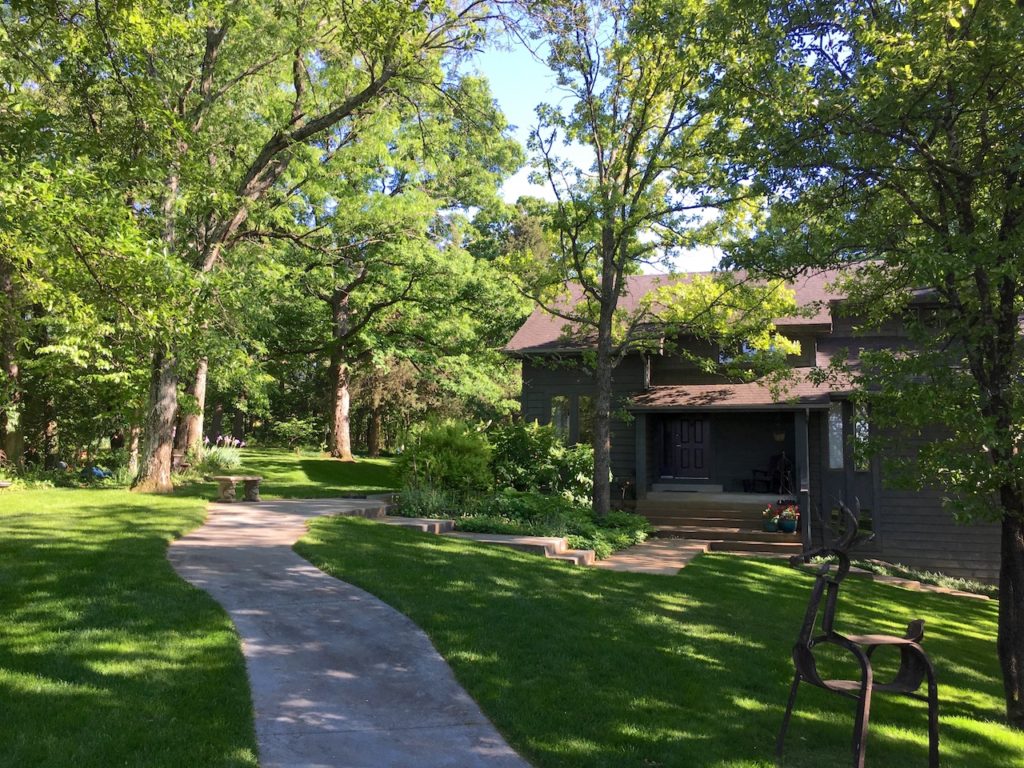
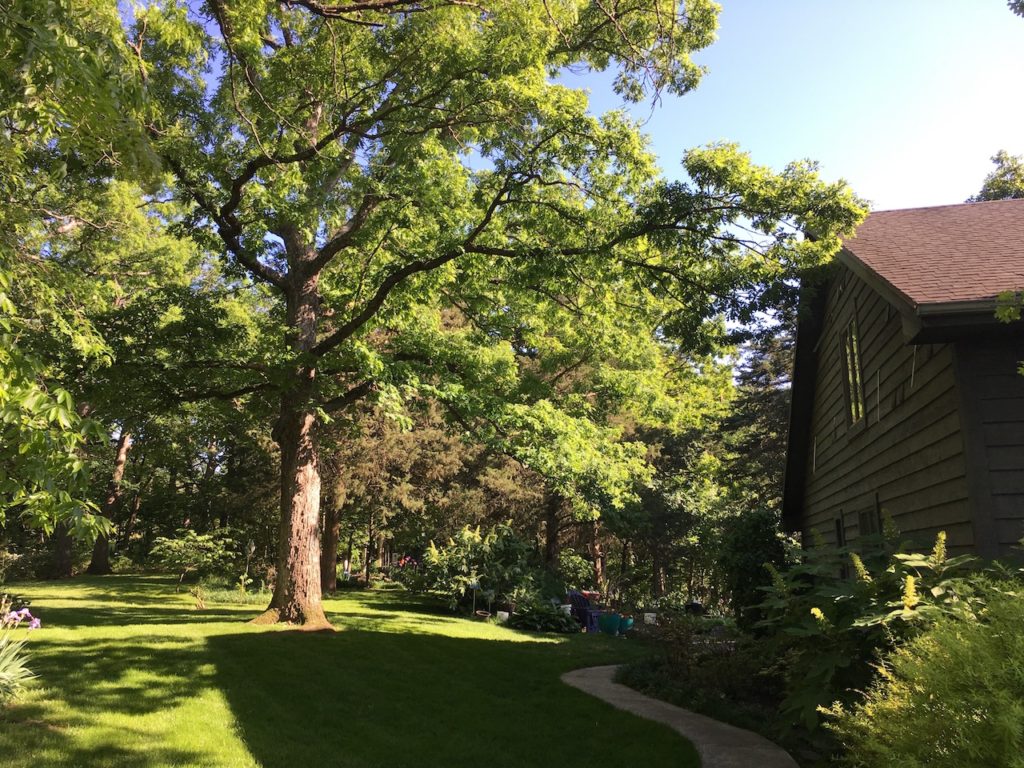
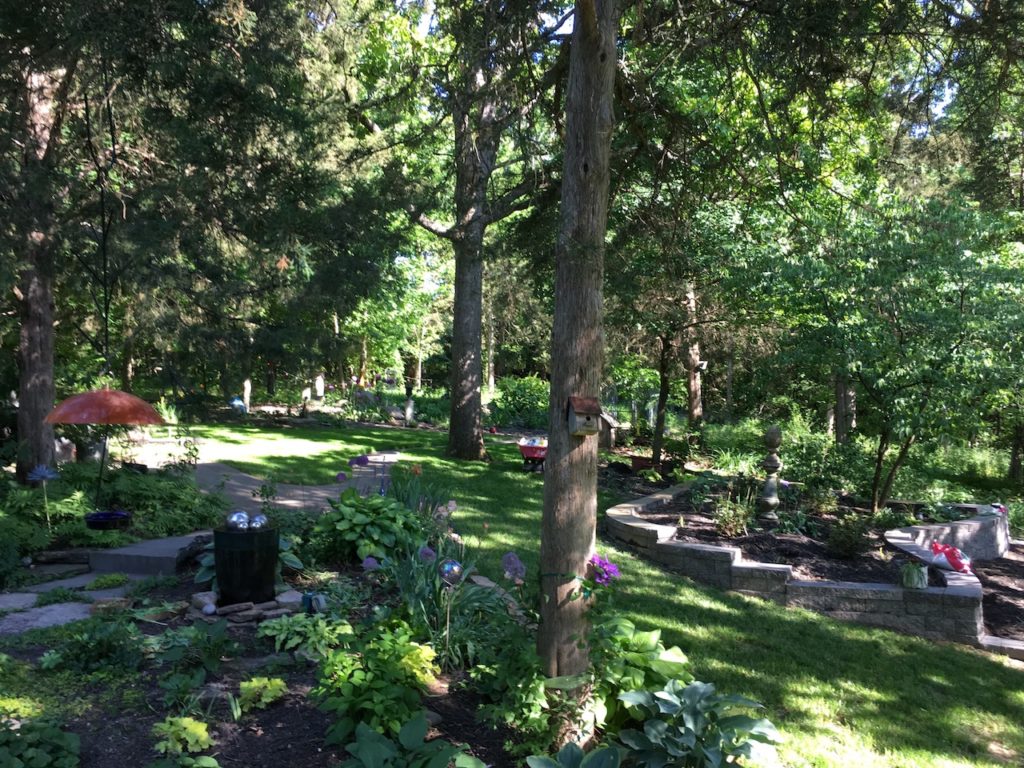
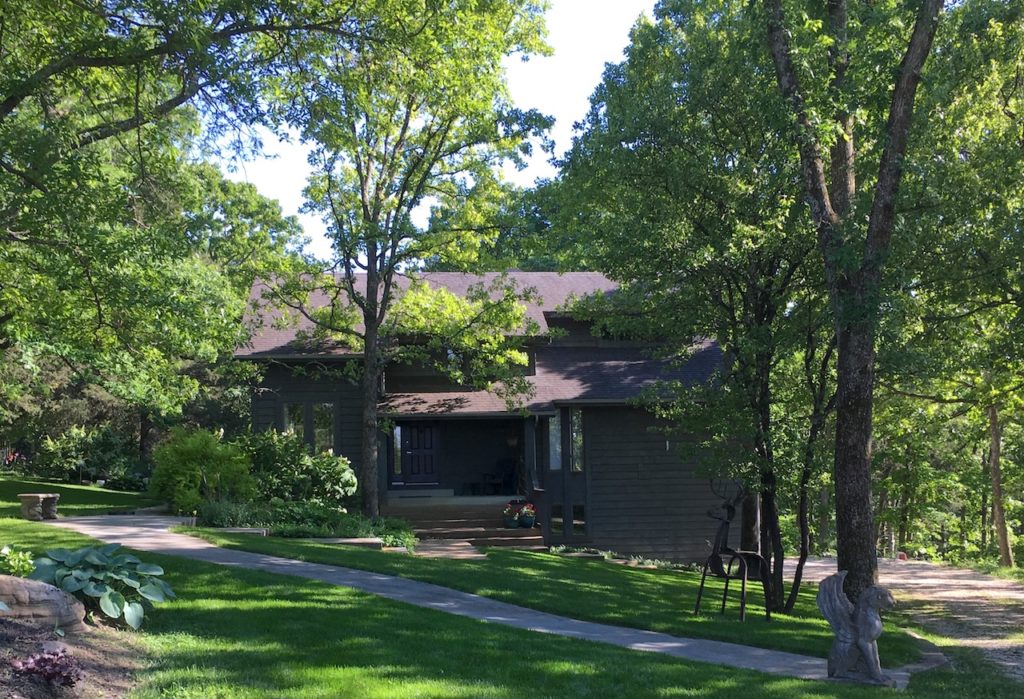
Author Archives: Steve Mays
ACT! and Reflex
 In the late 80’s I was doing affiliate relations for about 120 radio stations (in Missouri and Iowa). I had a card for each station in a Rolodex on my desk. Using a typewriter, I packed as much information on each card as possible. Station manager, program director, news director, address, phone, fax (few if any email addresses in ’87). By my right knee was a file drawer containing manila file folders for each station. This would contain copies of all correspondence; notes from phone calls and f2f visits. It was a paper world. The portable version of the Rolodex was a page with as much of the info as could be crammed on a sheet of paper. (Columns: City, GM, PD, ND, Address, Phone, Fax, etc)
In the late 80’s I was doing affiliate relations for about 120 radio stations (in Missouri and Iowa). I had a card for each station in a Rolodex on my desk. Using a typewriter, I packed as much information on each card as possible. Station manager, program director, news director, address, phone, fax (few if any email addresses in ’87). By my right knee was a file drawer containing manila file folders for each station. This would contain copies of all correspondence; notes from phone calls and f2f visits. It was a paper world. The portable version of the Rolodex was a page with as much of the info as could be crammed on a sheet of paper. (Columns: City, GM, PD, ND, Address, Phone, Fax, etc)
I had a computer on my desk but I don’t recall when I moved from DOS to Windows. But somewhere in here I was using Borland Reflex, a flat-file database management system for DOS. It was the first commercial PC database to use the mouse and graphics mode, and drag-and-drop capability in the report formatting module.
I used Reflex as a ‘customer relationship management’ program before there was such a thing (that I knew of). I was in heaven. I sorted and searched and generated reports. I used one field for notes (every phone call, letter and in-person visit).
Sometime around 1987 I was visiting Bill Weaver, the GM of KFRU in Columbia, MO, and I must have mentioned my little database. Bill showed me the program he used to manage all of his contacts: ACT! I was smitten! Did all the things I hacked out of Reflex but so much more. I immediately bought a copy and became insufferable to my co-workers.
While attending COMDEX in 1992 (Chicago), I saw what I believe was the first Windows version of ACT! $500 but I had to have it. Bought it on the convention floor.
I lived in ACT! for many years after. Probably well after Outlook took over the company network. Grown men were reduced to tears when they were forced to give up ACT!
Normal
“Normal is getting dressed in clothes that you buy for work and driving through traffic in a car that you are still paying for – in order to get to the job you need to pay for the clothes and the car, and the house you leave vacant all day so you can afford to live in it.”
― Ellen Goodman
Find oldest file in Google Docs/Drive
Maybe. This is the only way I could come up with. I have the Google Drive app on my MacBook. It syncs with my account in the cloud so anytime I add a file either place, within a few seconds it’s in both. When I open the app on my MacBook I see fields across the top just as I do in Finder (it might be finder). File name, Date modified, etc. I just added “Date created” and then sorted by that field (newest to oldest). Then I opened each folder, one at a time, and looked for the older file in that folder.
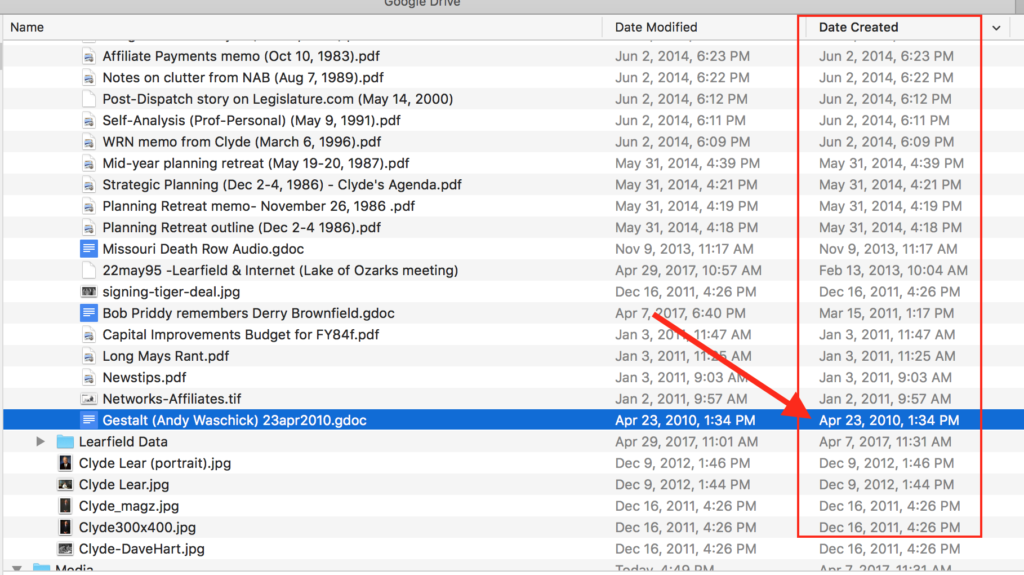 Assuming I’m not overlooking something, the oldest doc I have is from April of 2010. Google Drive launched in February 2007. This would mean I didn’t use Google for the first few years. Can’t imagine why but that’s possible.
Assuming I’m not overlooking something, the oldest doc I have is from April of 2010. Google Drive launched in February 2007. This would mean I didn’t use Google for the first few years. Can’t imagine why but that’s possible.
Interviews
This is a little housekeeping post. A list of people with whom I have done interviews. A search by name should take you to these. This link will pull them all up.
- Mary Quass – Radio (2003)
- Mike McKean – Journalism (2005)
- Dan Shelley – Radio/Journalism (2005)
- Kevin O’Keefe – Lawyer Blogs (2006)
- Dan Arnall – Journalism (2006)
- Ben Brogdon – Brushes with Near Greatness (2006)
- Dan Shelley – WCBS-TV (2006)
- Dave Shepherd – Radio (2007)
- Mike Spooner – Animation (2008)
- Jason Rogers – Fez-O-Rama (2008)
- Jonathan Brownfield – Sports Photography (2009)
- Joe Bankhead – KBOA (interview by Jeff Wheeler) (2009)
- Tim Robyn – State of Missouri websites (2009)
- Paul Roe – British Ink (tattoos) (2009)
- Clarence Lee Sherrill – Concrete Lawn Art (2009
- Tessie Hubbard – “Panty Mython” (2009)
- Tony Messenger – Covering state capitol (2009)
- Matthew Howard – Photography (2009)
- Keith Povall – UK buddy (2010)
- Jay Parks – Truck Drummer
- Bob Priddy – His career at Learfield (2014)
- Gaylon Watson – KBOA (2014)
- David Gerstmann – Beginning of WireReady (2017)
- David Brazeal – RepublicTigerSports.com (2017)
- Allen Hammock – Straylight (2017)
- Tom Boman – Learfield Sports (2017)
- Ash Furrow – Mastodon (2017)
- Landis Duffett – Teaching Chinese in high school (2018)
Allen Hammock Interview
In 1995 CompuServe, America Online and Prodigy started providing dial-up Internet access and people started getting online. In April some tech folks from the University of Missouri came to our offices in Jefferson City and gave us a demo of the “World Wide Web” and our first look at Netscape Navigator. I can’t speak for the others in the meeting but I was mightily impressed.
I knew a bit about the Internet but nothing about how to create a website or register a domain, so I contacted Mike McKean, a professor at the J-School at the University of Missouri, and asked if he could put me in touch with a student who knew how to do this stuff. He introduced me to Dan Arnall, a senior journalism major. Dan was technically adept but he brought along Allen Hammock who was majoring in computer science. Dan and Allen were high school classmates in Springfield, Missouri, and were in members of a student leadership organization at Mizzou.
In this 12 minute interview, Allen shares some of his recollections of the exciting three years that followed.
The “useless class” and a new quest for purpose
I was so impressed by Yuval Harari’s latest book it took me three blog posts to event touch on a few of his big ideas. In an article in The Guardian, he expands on a couple of (related) ideas: Basic Income and religion-as-virtual reality. He wrote at length about both of these in Homo Deus but I think the Guardian piece is new (not excerpts from his book).
I agree with Professor Harari that some kind of Basic Income is inevitable. It’ll happen because the wealthy will see it as the best (only?) way to protect all their shit. And what will we all do when we don’t have to have a job? One possibility is virtual reality.
For thousands of years, billions of people have found meaning in playing virtual reality games. In the past, we have called these virtual reality games “religions.” […] What is a religion if not a big virtual reality game played by millions of people together? Religions such as Islam and Christianity invent imaginary laws, such as “don’t eat pork”, “repeat the same prayers a set number of times each day”, “don’t have sex with somebody from your own gender” and so forth. These laws exist only in the human imagination. No natural law requires the repetition of magical formulas, and no natural law forbids homosexuality or eating pork. Muslims and Christians go through life trying to gain points in their favorite virtual reality game. If you pray every day, you get points. If you forget to pray, you lose points. If by the end of your life you gain enough points, then after you die you go to the next level of the game (aka heaven).
I really can’t see a flaw in that comparison. Unless you count, “Yeah, but Heaven and Hell are real and Grand Theft Auto Six is not.”
When you look at the objective reality of Jerusalem, all you see are stones and buildings. There is no holiness anywhere. But when you look through the medium of smartbooks (such as the Bible and the Qur’an), you see holy places and angels everywhere.
Whoa. The two big holy books as VR devices. And how about a game we all play?
Consumerism too is a virtual reality game. You gain points by acquiring new cars, buying expensive brands and taking vacations abroad, and if you have more points than everybody else, you tell yourself you won the game. You might object that people really enjoy their cars and vacations. That’s certainly true. But the religious really enjoy praying and performing ceremonies, and my nephew really enjoys hunting Pokémon. In the end, the real action always takes place inside the human brain.
What does it all mean?
The end of work will not necessarily mean the end of meaning, because meaning is generated by imagining rather than by working. Work is essential for meaning only according to some ideologies and lifestyles.
As one who has not worked for the the last four-and-a-half years, I’m here to tell you it is not necessary to give your life meaning.
WireReady
In September of 1990, while attending the NAB conference in Boston, I met a recent college graduate named David Gerstmann who had developed software to capture and manage wire service data on a personal computer. He called it WireReady. On a recent visit I asked David to talk about the early days of his company. (10 min)
I Liked the Old Me Better
“We just imagine what we want next and we build it”
That is how Ricardo Pessoa — the founder of Cool & Vintage — decides which cars to restore. I found several interviews and articles about Ricardo and his company.
“We are a couple of creative guys that have marketing/photography/fashion/filmmaking backgrounds and this is our take on cars. We were already dealing with restorations since we were driving mainly classic cars in our everyday life. We try to create the environment that will inspire people to use the cars, whether you buy it from us or not. The concept behind the company is to enjoy life through experiences and cars do that for us because we love to travel by car.”
That works for me. As does this:
“The new generation doesn’t want to buy from big, mainstream companies — they’re selective and look for small businesses who really care about their product and have a brand they can connect with”, comments Founder Ricardo Pessoa.
I’ve found lots of photos of the cars and the workshop but none of Ricardo yet. I’ll see if I can get one of him and the boys with “my” Land Rover.
